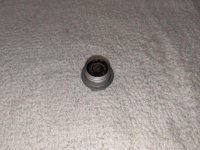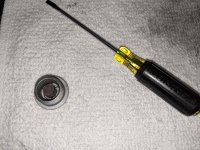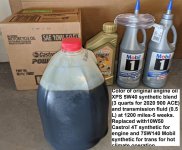I'm not going to go digging into my history & writing yet another epic broadcasting it any further than I have done already simply to placate your need to hear the minutae of things that are now part of my personal historical record (if you
REALLY want to know, you'll just hafta wait for & buy the book!

) but at the risk of dragging this out longer than it has been already, maybe you might consider the following Possible.... :dontknow:
ALL machinery that has moving parts relying on oil to protect wear between surfaces that also need to seal under pressure
needs to 'bed in' those moving parts & the 'wear surfaces' to some degree or another - IC Engines are just like all the rest in that matter - they have components that
need to 'bed in'; the piston rings, cylinder walls, etc as well as big-end bearings, et al are what I'm talking about. That 'bedding in' is enabled by letting the oil do it's thing in what has been at some stage of the engine's design & development, a carefully measured and monitored way. In the past, before oils became quite the 'quality products' they are today, manufacturers even specified better quality/specific grade 'running in' oils & a 'must be followed at risk of premature failure' running in process that allowed all this to occur; but these days, when there's not so much difference across the range of oils & the manufacturing itself is of a much higher quality & to a finer degree, that level of 'running in' is not quite so important, but it is
STILL NECESSARY!! So the design engineers & the manufacturers go to a fair amount of trouble to work out the necessary oil specs & the initial change intervals plus the long term servicing schedule etc to allow this 'bedding in' process to be achieved in such a way as to enable their products to work at their designed specification and ideally, to at least last as long as the warranty period - messing with
any of that stuff OR the carefully calculated timings during the initial 'bedding in' process (including that 'first oil change') risks that not occuring in the designed & planned manner! :lecturef_smilie:
If you've ever had anything much to do with race engines, you'll know that each engine guru/design engineer will have a specific 'bedding in' process for their engines, usually covering things like the oils used, the engine revs used, the loads imposed et al, frequently timing the process right down to the second!! If they don't run the engines at the right revs/load etc with their chosen oils for the specified duration, then the big end bearings might not 'bed in' on the crank as well/for the right temperature ranges; the cam lobes might not 'bed in' properly to lift the valves the exact distance required at the intended poofteenth of a nano-second; and/or the piston rings might not 'bed in' on the cylinder walls as well as intended, meaning that cylinder could be compromised due to minute scoring, glazing, or because the seal made between the cylinder walls & the rings isn't quite what's expected, so the compression isn't quite what it should be..... :gaah: . And there's also a bunch of other stuff that may be minutely but critically changed by not running the engine with that 'as sold' oil in it for a fairly specific length of time so that it goes thru its known & planned for 'shear down' process &/or follows its carefully measured 'lubrication/wear profile'.....

. Sure, race engines are a little bit different than 'mass produced engines' intended for general use, and those race engine gurus are trying to eke the most power from those engines AND ensure they last for what's really fairly short periods of actual use, but the concept still applies in theory as well as in practice to your road car and your Spyder, or in fact, any ICE - if you don't run the intended oil for the intended period then any one of those & many other things might not end up achieving exactly what the designers & engineers expect it to, usually to
your detriment in some way... even if you don't have the data or knowledge, skills etc to realise it!

That is, to a large degree, why many engine manufacturs these days do their own
initial 'bedding in' run & engine checks in-house - but they don't usually fully complete that process, simply because most don't have the time, the inclination, or the profit margins to cover the cost effective running of the engine for the equivalent of saaay, the thousand or so miles that it might actually take to fully complete the 'bedding in' process! Still, not to worry, they know that
most buyers won't go changing out the oil on their new vehicle's engine themselves, and even if they do, there's a good chance that the new vehicle owner won't do it
too much either side of the recommended/scheduled period, so the engineers are generally fairly confident that the 'normal driving' the new owner does before that carefully considered & timed 'first oil change' will take care of the rest, won't it?

hyea:
Many here will be able to attest from their own experience that the initial use they put their vehicle to often has an impact on the way that engine performs for the rest of their ownership - and a
LOT of that is very much dependent upon the way they've driven the vehicle during (the rest of) it's 'bedding in' period -
drive it like you intend to use it has become pretty much the modern catch-cry for 'running in', albeit usually with a few caveats regarding not over-revving it or not driving at set revs for extended periods.... And those who might instead 'baby' their new engine or those who thrash it to within an inch of its life within that 'bedding in' period often don't realise &/or if they do realise, understand why their engine doesn't do as well, last as well, or maybe perform as well as anyone elses! :shocked: As I've experienced in my working life and said earlier here, there's also a risk that changing out your 'as sold' oil fill too much too soon (or too much too late!) might do just the same sort of thing, only most of us don't have the where-with-all to readily recognise this. But it
CAN and
DOES still happen to some; occasionally catastrophically, more likely completely un-noticed by the new owner, even if they can't detect it.

Have you ever wondered why some people invariably get better (or worse) fuel economy to you; or why some who own an apparently identical machine get better (or worse) performance than yours? If you had the where-with-all, then from my experience & hard learned knowledge, I'd suggest that looking into the 'bedding in' process you used and when you did the 'as sold' oil fill change-out it
might be very revealing. And I really doubt that I'm the only person to ever suggest that doing an early 'as sold' oil fill change-out might not be such a great idea, too!

But remember, it's
YOUR Spyder, you can choose to do with it as you will - I've said my piece, given my word of caution, you now get to do whatever you like to your machine! :cheers:




